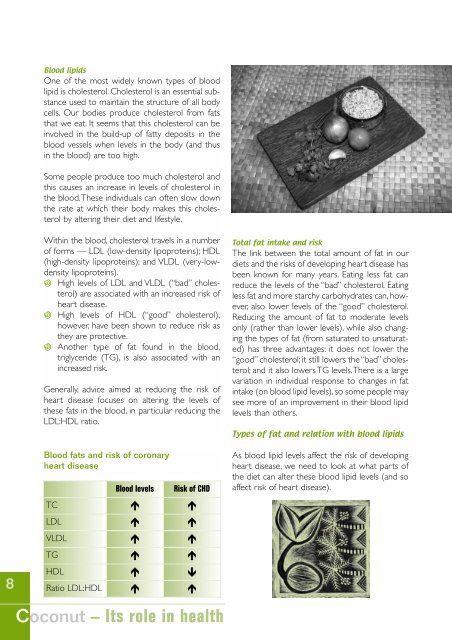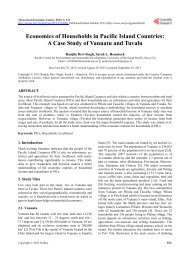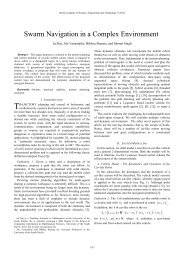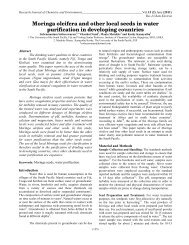Coconut - Secretariat of the Pacific Community
Coconut - Secretariat of the Pacific Community
Coconut - Secretariat of the Pacific Community
Create successful ePaper yourself
Turn your PDF publications into a flip-book with our unique Google optimized e-Paper software.
8<br />
Blood lipids<br />
One <strong>of</strong> <strong>the</strong> most widely known types <strong>of</strong> blood<br />
lipid is cholesterol. Cholesterol is an essential substance<br />
used to maintain <strong>the</strong> structure <strong>of</strong> all body<br />
cells. Our bodies produce cholesterol from fats<br />
that we eat. It seems that this cholesterol can be<br />
involved in <strong>the</strong> build-up <strong>of</strong> fatty deposits in <strong>the</strong><br />
blood vessels when levels in <strong>the</strong> body (and thus<br />
in <strong>the</strong> blood) are too high.<br />
Some people produce too much cholesterol and<br />
this causes an increase in levels <strong>of</strong> cholesterol in<br />
<strong>the</strong> blood.These individuals can <strong>of</strong>ten slow down<br />
<strong>the</strong> rate at which <strong>the</strong>ir body makes this cholesterol<br />
by altering <strong>the</strong>ir diet and lifestyle.<br />
Within <strong>the</strong> blood, cholesterol travels in a number<br />
<strong>of</strong> forms — LDL (low-density lipoproteins); HDL<br />
(high-density lipoproteins); and VLDL (very-lowdensity<br />
lipoproteins).<br />
i High levels <strong>of</strong> LDL and VLDL (“bad” cholesterol)<br />
are associated with an increased risk <strong>of</strong><br />
heart disease.<br />
i High levels <strong>of</strong> HDL (“good” cholesterol),<br />
however, have been shown to reduce risk as<br />
<strong>the</strong>y are protective.<br />
i Ano<strong>the</strong>r type <strong>of</strong> fat found in <strong>the</strong> blood,<br />
triglyceride (TG), is also associated with an<br />
increased risk.<br />
Generally, advice aimed at reducing <strong>the</strong> risk <strong>of</strong><br />
heart disease focuses on altering <strong>the</strong> levels <strong>of</strong><br />
<strong>the</strong>se fats in <strong>the</strong> blood, in particular reducing <strong>the</strong><br />
LDL:HDL ratio.<br />
Blood fats and risk <strong>of</strong> coronary<br />
heart disease<br />
Blood levels Risk <strong>of</strong> CHD<br />
TC F F<br />
LDL F F<br />
VLDL F F<br />
TG F F<br />
HDL F A<br />
Ratio LDL:HDL F F<br />
<strong>Coconut</strong> – Its role in health<br />
Total fat intake and risk<br />
The link between <strong>the</strong> total amount <strong>of</strong> fat in our<br />
diets and <strong>the</strong> risks <strong>of</strong> developing heart disease has<br />
been known for many years. Eating less fat can<br />
reduce <strong>the</strong> levels <strong>of</strong> <strong>the</strong> “bad” cholesterol. Eating<br />
less fat and more starchy carbohydrates can, however,<br />
also lower levels <strong>of</strong> <strong>the</strong> “good” cholesterol.<br />
Reducing <strong>the</strong> amount <strong>of</strong> fat to moderate levels<br />
only (ra<strong>the</strong>r than lower levels), while also changing<br />
<strong>the</strong> types <strong>of</strong> fat (from saturated to unsaturated)<br />
has three advantages: it does not lower <strong>the</strong><br />
“good” cholesterol; it still lowers <strong>the</strong> “bad” cholesterol;<br />
and it also lowers TG levels.There is a large<br />
variation in individual response to changes in fat<br />
intake (on blood lipid levels), so some people may<br />
see more <strong>of</strong> an improvement in <strong>the</strong>ir blood lipid<br />
levels than o<strong>the</strong>rs.<br />
Types <strong>of</strong> fat and relation with blood lipids<br />
As blood lipid levels affect <strong>the</strong> risk <strong>of</strong> developing<br />
heart disease, we need to look at what parts <strong>of</strong><br />
<strong>the</strong> diet can alter <strong>the</strong>se blood lipid levels (and so<br />
affect risk <strong>of</strong> heart disease).
















